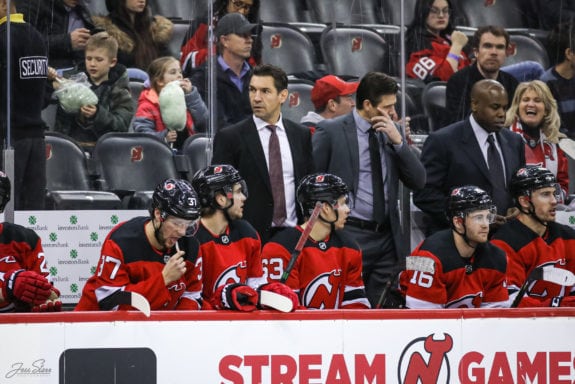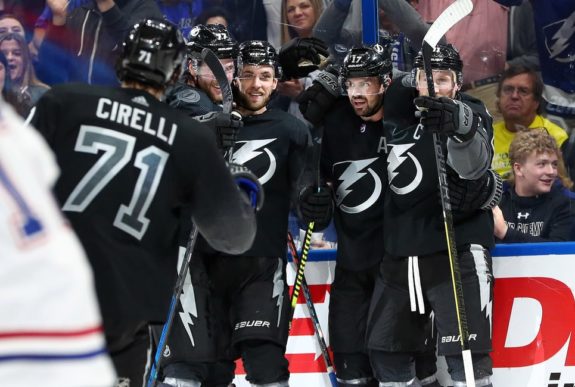Alain Nasreddine watched New York Rangers defencemen go to the front of the net and hang out below the goal line.
It wasn’t like this back in his playing days.
Nasreddine scored one goal in 74 NHL games as a defenceman from 1998-2008. Now, the interim New Jersey Devils coach sees a league in which defencemen are counted on to score, and they’re making good on that expectation.
Goals are coming from everywhere this season: lacrosse-style from Andrei Svechnikov and Filip Forsberg, a ton from the blue line and even one from Nashville goaltender Pekka Rinne. A total of 659 different players have scored at least one goal this season, a testament to balanced attacks around the league.
“You want a five-man offence,” Nasreddine said. “The way the game is played right now, you need a five-man offence with D-men joining, whether that’s off the rush or in the offensive zone.”

Goal-scoring is at over six a game for the second consecutive year and just the third time in the past 23 seasons. The top four goal-scorers are all forwards age 24 or younger, but even more impressively, just under 200 defencemen have combined to put up 725 goals.
Offense from the Blue Line
The buzz is all about Washington’s John Carlson, who’s on pace to be the NHL’s first 100-point defenceman since Brian Leetch in 1991-92. But he’s just the leading defenceman with styles moving more and more toward getting them involved in the offence.
“Nowadays, everybody activates the D,” Arizona Coyotes coach Rick Tocchet said. “I don’t think there’s a team that doesn’t try to get their D to join the rush. You can’t just have your top two defencemen (be) offensive guys. You have to have everybody participate.”

Look no further than the Nashville Predators for a prime example of that. Even after trading P.K. Subban, Nashville’s blue line can still pile up the goals and has combined for 29 through 48 games.
“Teams want their defencemen to jump up, want their defencemen in the play,” Predators defenceman Roman Josi said. “Every team has kind of that fourth guy in the rush all the time, and even in the O-zone, teams are moving. I think that’s just kind of the way the game is now.”
The game is trending that direction so much that Carolina Hurricanes coach Rod Brind’Amour tells his team, “You score off the rush and you score on the power play.” Carolina defenceman Jaccob Slavin said odd-man rushes with defencemen are “the best opportunities to score” and that, combined with the talent of young defencemen like Dallas’ Miro Heiskanen, Colorado’s Cale Makar and Buffalo’s Rasmus Dahlin, has been responsible for much more offence from the back end.
“You look at the young guys coming in: Heiskanen, Makar, some of these really young guys, and they come in and they’re contributing right away,” Slavin said. “I think some teams are driven by their defence, and when their defencemen are going, that’s when the team’s playing really well. Some of those teams have those offensive defencemen that are expected to put up big numbers.”

Josi, whose 14 goals sit one off the league lead, doesn’t believe there’s as much pressure on defenceman to produce as forwards deal with. He’s a perennial Norris Trophy contender in part because of how much emphasis he puts on defence, though he’s also the prototypical modern-day blue liner in that he can do it all.
“You’re a defenceman and your primary job is to defend well,” Josi said. “But if you’re on the power play, if you consider yourself a two-way defenceman, yeah, you want to produce offensively, too.”
Nasreddine points out that teams like the Rangers — who lead the NHL in defenceman scoring — and the Capitals often let their defencemen go to the front of the net or even below the goal line. That used to be a no-no except for some of hockey’s best who could handle those responsibilities; now it’s just part of what coaches expect, and it’s changing who’s playing the position.

“That’s why you’re seeing more mobile defencemen, skating defencemen, because most coaches want those defencemen to be involved in the offence,” Nasreddine said. “It’s been going for a while now, but you see it more and more.”
LIGHTNING STRIKING
Not long ago, the Tampa Bay Lightning sat outside a playoff position in the Eastern Conference, raising some concern about whether they could flip a switch. After winning the Presidents’ Trophy as the top regular-season team and getting swept out of the playoffs in the first round last season, it was fair to worry about the Lightning not putting as much value in the 82-game grind this time.
Tampa Bay is 12-2-1 since just before Christmas and now trails Atlantic Division-leading Boston by just seven points with two extra games left to play.

“We don’t think about the future or think about the past,” Lightning goaltender Andrei Vasilevskiy said. “If you’re going to think about your future, you’ll miss your present so that’s our philosophy for right now.”
GAME OF THE WEEK
Sidney Crosby and Evgeni Malkin will be looking to exact some revenge for a recent regulation loss to Philadelphia when the Pittsburgh Penguins host the Flyers on Friday.
LEADERS (THROUGH MONDAY)
Goals: David Pastrnak (Boston), 37; Assists: Connor McDavid (Edmonton), 49; Points: McDavid, 76; Ice Time: Thomas Chabot (Ottawa), 26:27; Wins: Vasilevskiy, 24; Goals-Against Average: Ilya Samsonov (Washington), 2.06; Save Percentage: Tristan Jarry (Pittsburgh), .929.
___
Follow AP Hockey Writer Stephen Whyno on Twitter at https://twitter.com/SWhyno
___
More AP NHL: https://apnews.com/NHL and https://twitter.com/AP_Sports
Stephen Whyno, The Associated Press